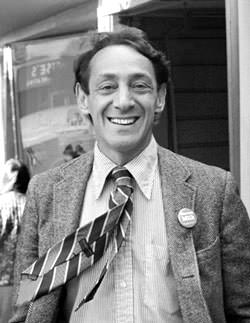Off With the Law
Finally, Milk had won a Board of Supervisors campaign he had attempted many times before, winning by 30%. However, with the win came an increase in death threats. He was concerned about the possibility of being assassinated, so he would record his thoughts, saying into the tape, “if a bullet should enter my brain, let that bullet destroy every closet door.”
During his time in office, Milk began his tenure with his sponsorship of a bill that would outlaw discrimination towards homosexuals. According to the New York Times, when the bill Milk supported was passed, “the growing political power of homosexuals” was demonstrated. Not only was the political power of the gay community expanding, but so were the sizes of the Gay Freedom Day Parades in San Francisco, growing to 250 000- 375 000 attendees in 1978.
On November 27, 1978, Harvey Milk’s time on San Francisco’s Board of Supervisors came to a tragic end. Daniel White, a supervisor who had resigned from his position, assassinated Harvey Milk and the city’s Mayor, George Moscone. Even in death, Milk’s message rang clear: homosexuals need to fight for their freedom, country, for themselves, and to no longer hide quietly in their closets.
The Present Reality
Much progress has been made in favour of the LGBT community since Stonewall and Harvey Milk. For example, Tammy Baldwin made American history when she was voted in as Wisconsin’s Senator, the first openly-lesbian politician to do so. American States are starting to legalize same-sex marriage, following the paths of Canada and many European countries. Despite all the progress, though, there are still many fights for gay freedom and equality to be won.
Many religious leaders and manuscripts still deem homosexuality a sin. For instance, in his 2012 Christmas address, the Pope deemed homosexuality a, “manipulation of nature.” Apparently gay marriage is a threat to world peace.
Other homosexuals cannot be open about their sexuality due to cultural punishments. If a Muslim is gay, he cannot come out to anyone in his family or culture as the Qur’an deems homosexuality a sin that is to be punished with death by stoning. Knowing people in that situation, they keep their preferences to themselves. They hope that if they are ever discovered that their families choose to spare their lives and ostracize them instead.
Though the world will always be riddled with homophobes, there will always be allies who support the LGBT community. And if societies could put as much effort into acceptance and getting along as they do hatred and discrimination, this world would be a better place.
The Right to Be a Girl
Jean Lowden, at 99 years old, has lived through most of the events that have made up modern history, including Canada’s Suffragist movement. She was young when it happened, and at her age, she doesn’t remember much of what went on. Though her mother and sisters would have remembered events differently, in an interview, Jean said, “as far as I’m concerned, I’ve always had rights.”
Women’s suffrage movements have been around since the late 1800’s, with the first success occurring in New Zealand in 1895. In North America, suffrage movements came about with the end of the First World War. And in Canada, Quebec granted women their rights in 1917, along with Ontario. By 1940, the remaining women in the country had equal rights.
[pullquote]as far as I’m concerned, I’ve always had rights[/pullquote]
Given how long ago Canada’s Suffragist Movements occurred, it isn’t any wonder that we females feel like we’ve always had the right and freedom to work, get the education we want, and vote. Unfortunately, there are still parts of the world where women face extreme discrimination, and those women are rising up and fighting back.
Malala Yousafzai
What is perhaps the most angering yet inspiring fight for girls rights occurred on October 9, 2012 when Malala Yousafzai, a 15 year old girl, was shot in a school bus in Pakistan by the Taliban. Malala has been fighting for girls to have the right to an education since she was 11 years old. In 2008, when the Taliban tried to shut down schools for girls, Malala, infuriated, stated at a local press club, “How dare the Taliban take away my basic right to education?”
In the years leading up to the attack on Malala, the Taliban had been working to shut down educational institutions that catered to girls. Schools were bombed and girls were banned from getting an education in January 2009. Soon thereafter, Malala was able to resume her studies, while still finding time to speak up for the right for girls to go to school.
In 2009, Malala became the Chair of District Child Assembly Swat, an organization fighting for the right for girls to go to school. For her efforts, she was nominated for the International Children’s Peace Prize. Thus began her celebrity status, which grew when she received the National Youth Peace Prize in December 2011. With this, the Taliban had come to hate the young female activist, and determined that Malala’s life must be terminated.
























Share the post "Off With the Law"